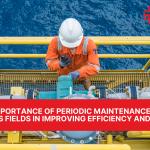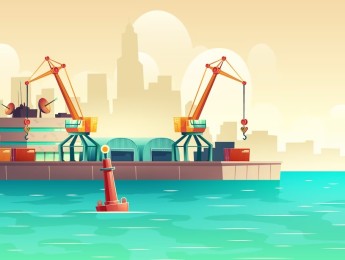The gas and oil offshore industry plays a massive role in boosting the global economy and fuels businesses and homes to keep profits high. However, hosting an offshore site can present challenges from a safety and operational perspective and is open to risks from a business continuity perspective. Because the offshore platform is also something that other businesses rely on to function, it’s essential that issues are dealt with promptly and changes are made to prevent similar circumstances from occurring in the future.
To ensure proper running of these platforms, it’s essential to understand the full operational project from end to end and ensure key processes are adhered to and function appropriately. For this reason, regular site inspections are required to record areas of concern, identify potential risks, and design and execute recovery plans when required.
For those responsible for auditing and inspection, there should be a key checklist of areas to review, a set schedule, and a system to accurately record results for future reporting and change management. It’s essential that everyone involved agrees on areas that require change, proactively works on a strategic project plan to make continuous improvements, and regularly reviews data, feedback, and previous inspections to understand where improvements are needed the most.
Upon completion of this course, participants will be able to:
- Understand inspection techniques for offshore platforms.
- Develop an auditing and risk assessment process for offshore and marine platforms.
- Implement processes around health and safety regulations.
- Record and monitor regularly scheduled inspections to determine the next business improvement and continuity steps.
- Create accurate and secure record-keeping mechanisms to ensure continuous review and improvement.
- Learn about the differences between floating and fixed offshore platforms.
- Maintain subsea platforms and avoid potential incident development.
- Develop future-proofed business plans against a strategic framework to ensure the offshore platform delivers a return on investment.
- Monitor platform performance against competitors or other industry leaders.
- Understand the development of FPSO and FLNG regulations within offshore platforms.
- Develop using the most up-to-date systems and forecasting models to increase profits.
This course is designed for anyone responsible for managing operations or improvements for offshore or marine platforms. It would be most beneficial for:
- Marine and Offshore Engineers
- Project Planners
- Marine Engineers
- Operations Managers
- Risk Assessors
- Auditors
- Health & Safety Executives
This course uses multiple learning styles to aid full comprehension and understanding. The course uses a video and presentation to display real-world examples of positive inspection planning and the implications of missing potential risks.
Participants will participate in group discussions to determine strategic priorities and risk-oriented plans for inspection and work on project plans to mitigate risks from a financial, partnership, and people perspective.
Role-playing activities will be conducted to iron out action plans to remove future risks and build relationships with those involved to correct problems for the future.
Day 5 of each course is reserved for a Q&A session, which may occur off-site. For 10-day courses, this also applies to day 10
Section 1: The Essentials of Offshore Engineering
- The different types of offshore platforms.
- Requirements and regulations when considering offshore risk.
- Field development and offshore maintenance.
- Exploration of new systems and processes.
- Procedure evaluation and proposed changes.
- Life cycle of petroleum reservoirs.
- Offshore engagement and investigation techniques.
Section 2: Inspections & Regulations
- Inspection types and what works best for your site.
- Risk-based inspection benefits and methodology.
- Inspection coverage and high-risk areas.
- Above and below water inspection procedures.
- Conformance guidelines and how to report non-conformance.
- Incident logging and handling hazardous situations.
- Making changes after an incident.
- Safety components.
- Steel offshore inspections.
Section 3: Floating Offshore Platform Inspections
- Risk-based inspection (RBI) overviews
- Mooring and riser systems RBI development.
- Hull structures and RBI management.
- Development of Topsides for RBI.
- Program submittal requirements.
- Risk-based inspection key areas and identification.
Section 4: Effective Risk Assessments & Subsea Maintenance
- Risk assessments and project development.
- Subsea equipment design and safety elements.
- The RBI pipelines and planned change.
- Pipeline repair models.
- Remote Operational Vehicles (ROV) and their safety features.
- ROV training models.
- Autonomous Underwater Vehicles (AUV) for inspection purposes.
- The next generation of inspections.
Section 5: Marine Facilities Management - FPSO & FLNG
- FPSO regulations.
- FLNG operations.
- Regulations and their regular checks and maintenance.
- The standards and codes of practice.
- Turret, swivel, and mooring operations.
- Subsea Umbilicals, Risers & Flowlines (SURFs)
- Managing a subsea facility within future forecasts.
Upon successful completion of this training course, delegates will be awarded a Holistique Training Certificate of Completion. For those who attend and complete the online training course, a Holistique Training e-Certificate will be provided.
Holistique Training Certificates are accredited by the British Assessment Council (BAC) and The CPD Certification Service (CPD), and are certified under ISO 9001, ISO 21001, and ISO 29993 standards.
CPD credits for this course are granted by our Certificates and will be reflected on the Holistique Training Certificate of Completion. In accordance with the standards of The CPD Certification Service, one CPD credit is awarded per hour of course attendance. A maximum of 50 CPD credits can be claimed for any single course we currently offer.
- Course Code IND01-112
- Course Format Classroom, Online,
- Duration 5 days














